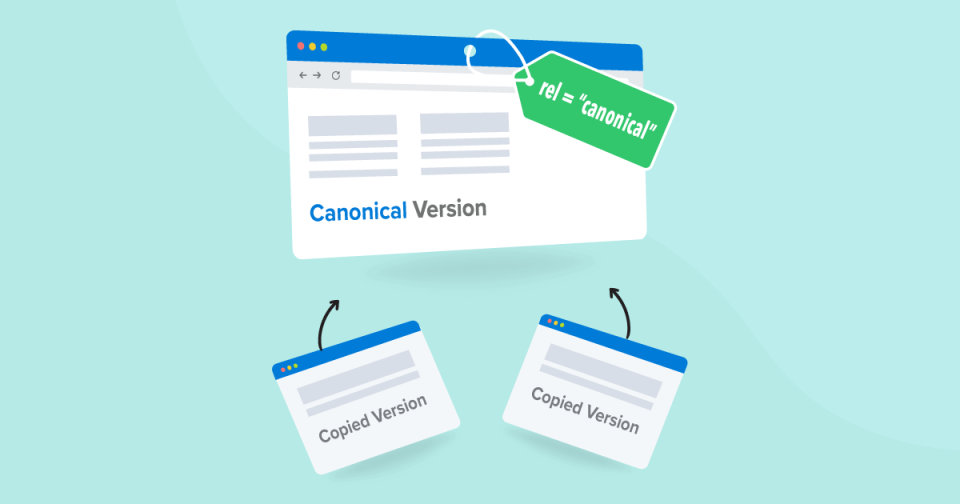What is Canonical Tag or Canonical URL – The Definition
Contents
Canonical Tag is an HTML element that tells the search engine to ignore all other versions of a page and consider the one marked within the canonical URL for ranking purposes.
Very often, certain websites have different duplicate pages with duplicate URLs, and each of these different URLs leads to different pages. A canonical URL is the page URL that best represents the page. Canonical URLs are highly influential in search engine optimization rankings, which is in more than two ways.
Impact of canonical URLs
Firstly, they directly impact search engine optimization by affecting the search results. Secondly, and most importantly, they also have a steady influence on the general rankings of a website owing to more than just one factor, such as the experience of the user, the structure, and the flow of the PageRank.
Canonical URLs or tags are more than just tools for search engine optimization rankings and have various usages and work in various ways. A close look at this article’s most important details may help to understand the same.
Why canonical URLs are created?
Duplicate content issues create a significant problem, and canonical URLs can solve this problem as efficiently as possible. Therefore, the existence of multiple duplicate pages helps to get displayed in the Search Engine Results Page.
Thus, exercise total control over which web pages here. Thus, canonical URLs help greatly when it comes to the internet.
The technical aspects of canonical URLs
Canonical tags are tools or objects that reside in the code for separate, individual pages in the website. The most predominant purpose of a canonical URL is to inform search engines such as Google which the “master” or “real” version of the websites are.
A canonical URL informs the search engine which URL to display, since search engines treat websites and web pages differently.
Why should canonical URLs be used?
There are various uses of canonical URLs, such as :
- There is a need to speed up the crawl rate of Google for the website under consideration, and in this case, canonical URLs can help significantly by sorting out the useful URLs.
- Canonical URLs informs the search engine which need to be displayed and ranked and shown on the search engine results page. They will also recognize backlinks from various “master” websites and consolidate the “link juice”.
- Canonical URLs help you with syndicated articles that can be promoted on other sites, and then the URLs can be used to find the original article.
Search engine optimization, affected by canonical URLs in the following ways.
- Canonicalization of pages in an appropriate manner can result in a general boost in rankings due to multiple factors, as mentioned before: When it comes to search engine optimization, canonical URLs help greatly by prioritizing a certain set of webpages over another, based on specific criteria and thus, have a significant impact on the pages that you are viewing.
- The search results can get directly affected: Canonical tags can help web pages and thus, control the display of website’s activities.
Thus, made quite clear that canonical tags get as quite significant. Thus, it is crucial to know these various ways. These various ways are as follows.
- In case of the presence of the same or similar content on more than one domain, a canonical tag helps to inform Google about the master version and the importance.
- Many websites with dynamic product parameters should be ignored in the Google Search Code.
- The entirety of the URL should be included in the canonical URL, and none of it should be left out. The entire name is essential.
- In the case of multiple languages in the Sitecore implementation, the language of the canonical URLs must be specified clearly.
- If separate pages with desktop URLs remain, then the link rel=” alternate” tag proves efficient.
Some other ways-
- The preferred URL for the duplicate content, also identified with one of the essential points. The preferred URL is also the canonical URL. Hence, a rel=” canonical” link, added from the duplicate pages to the canonical page.
- The canonical tag, used mainly for self-reference in a canonical page. Hence, one of the significant implementation processes of canonical URLs. Hence, recommended by various search engines, such as Google.
Should every single webpage have a canonical URL?
Yes, every page should have a canonical URL to benefit the website itself. Hence, avoid any confusion about the content on the page. Having a canonical URL helps to get rid of duplication of the content. Even in case of the absence of duplicate versions of the page, the webpage should have canonical URLs.
Where to find the canonical URL?
The canonical URL, primarily found in the HTML header of the page. This tells the user if there exists a more vital version of the same page.
Conclusion
So, canonical URLs are essential in various ways, and therefore one must be aware of their various implementation processes. And quite naturally, before one uses them, one must know about the various reasons why they are essential. Also, recommended by search engines and how they prove as advantageous, and beneficial. They are quite easy to understand and implement. Thus, a winning strategy for search engine optimization rankings and having control over the SERPs.

